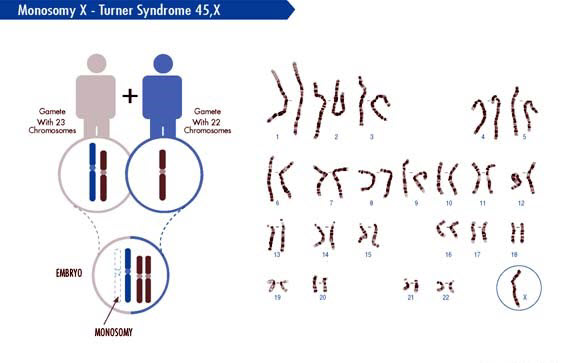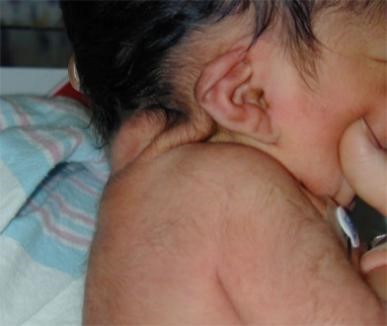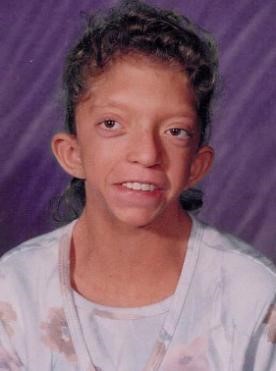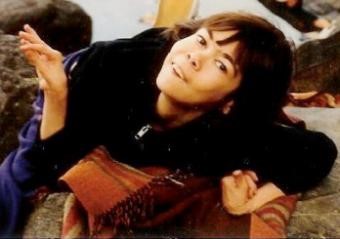Turner syndrome, also known as Ullrich-Turner syndrome, Turners syndrome, or Gonadal dysgenesis, is a chromosomal disorder in females. A female develops it when part or all of a second sex chromosome is missing in cells. About 1 in every 2500-3000 girls born with Turner syndrome, so it is important to learn a bit more about it. Keep reading to find out more about signs and symptoms of Turner syndrome as well as some Turner Syndrome photos.
What Are the Signs and Symptoms of Turner Syndrome?
There are certain signs and symptoms associated with Turner syndrome. For instance, unborn females with this syndrome may develop lymphedema, which refers to a condition in which fluid fails to move to the organs and leaks into the surrounding tissue. This results in swelling. Babies with Turner syndrome (TS) may have swollen feet and hands. They may also have a thick neck tissue, lower than normal body weight, and swollen neck.
Several other signs and symptoms become evident after birth or during infancy. Some of them are broad chest, eyelids that droop, low set ears, narrow palate, delayed growth, short hands, and fingernails that turn upward. Females with TS will also have small lower jaw and smaller weight and height at birth. You may also notice their arms turned outwards at the elbows. Web-like neck, widely spaced nipples, and wide neck are some other common signs and symptoms of Turner syndrome that can easily be seen in most Turner Syndrome photos.

Later Indicator of Turner Syndrome
It is important to understand that in some rare cases, you do not notice any signs and symptoms of Turner syndrome until later on. Most of the physical symptoms are due to issues like hypothyroidism. Females with TS may also have hypertension, brittle bones, and diabetes. Middle ear infection or Otitis media is very common among girls with TS. This often results in hearing loss in adulthood.
Causes of Turner Syndrome
Experts believe that the abnormality of the X-chromosome takes place spontaneously. It means that if you have a child with Turner syndrome, it does not mean any subsequent children will also have the condition. Turner syndrome occurs at the time of conception when the sperm fertilize the egg. Since TS occurs when there is an issue with the second X chromosome, the condition only affects females.

Turner Syndrome Photos in Real Life
Here are some Turner syndrome photos to help understand more about different signs and symptoms usually evident in females with TS.
Low hairline at the back of the head:

Web-like neck:

Low set ears:

Widely spaced nipples:

Turner Syndrome Photos of Normal People and Their Life Stories
As mentioned earlier, one in every 2500 females are born with this condition, so it is not that rare. You may in fact know someone with this condition. Here are more Turner syndrome photos of normal people and their stories.
Carly Joy
 Carly Joy is now six years old. She had a difficult birth and was diagnosed with TS at birth. She faced a number of health issues when she was very young, and this made her skip school off and on, but she is now in preschool and loves dancing and gymnastics.
Carly Joy is now six years old. She had a difficult birth and was diagnosed with TS at birth. She faced a number of health issues when she was very young, and this made her skip school off and on, but she is now in preschool and loves dancing and gymnastics.
Marissa
 Diagnosed with TS at birth, Marissa is now 12 years old. She had faced so many health issues and paid her first visit to an endocrinologist when she was only two weeks old. She has even faced health issues unrelated to TS, but she never let her health condition take better of her. She loves every minute she spends at specialized camp for Turner Syndrome and wants to be a veterinarian in future.
Diagnosed with TS at birth, Marissa is now 12 years old. She had faced so many health issues and paid her first visit to an endocrinologist when she was only two weeks old. She has even faced health issues unrelated to TS, but she never let her health condition take better of her. She loves every minute she spends at specialized camp for Turner Syndrome and wants to be a veterinarian in future.
Laurie
 Laurie was diagnosed with TS when she was only 14. She is now 49 years old and has dealt with several health issues during the last 35 years. There were not many treatment options available back in 1975, so she started on hormone replacement therapy after her diagnosis. This helped her gain about three inches in height – she is now 4 feet and 10 inches tall. At age six, she even had a surgery for coarctation of the aorta. She fought with TS very well until 1994 when it all changed when she was diagnosed with Crohn's Disease. Later, she developed Immunoglobulin Deficiency/PIDD, which was also related to the Turner Syndrome. Multiple chronic health issues disabled her and kept her from working after 1994. Still, she believes it is possible to live with TS if you get enough support and love from family and friends.
Laurie was diagnosed with TS when she was only 14. She is now 49 years old and has dealt with several health issues during the last 35 years. There were not many treatment options available back in 1975, so she started on hormone replacement therapy after her diagnosis. This helped her gain about three inches in height – she is now 4 feet and 10 inches tall. At age six, she even had a surgery for coarctation of the aorta. She fought with TS very well until 1994 when it all changed when she was diagnosed with Crohn's Disease. Later, she developed Immunoglobulin Deficiency/PIDD, which was also related to the Turner Syndrome. Multiple chronic health issues disabled her and kept her from working after 1994. Still, she believes it is possible to live with TS if you get enough support and love from family and friends.
Jane
 Born on June 9, 1963, Jane died in 2011 when she stopped breathing during a seizure. She was 48 years old at the time of death. She had TS at birth, but no one suspected it until she turned four months old and started experiencing infrequent episodes of choking. After so many visits to hospital, it was found that she had an aortic valve circling her esophagus, which required surgery. She had experienced a neurological issue when she turned 2, and doctor diagnosed her with Cerebral Palsy. She had a chromosomal test when she was 13 and that finally confirmed that she had only 45 chromosomes instead of 46 and was in fact suffering from Turner Syndrome. It was difficult to treat her because she did not receive hormonal therapy after birth. She started getting estrogen when she was already 37 years old. It really helped her, but could not prevent osteoporosis that negatively affected her quality of life, and she finally lost the battle when she was only 48.
Born on June 9, 1963, Jane died in 2011 when she stopped breathing during a seizure. She was 48 years old at the time of death. She had TS at birth, but no one suspected it until she turned four months old and started experiencing infrequent episodes of choking. After so many visits to hospital, it was found that she had an aortic valve circling her esophagus, which required surgery. She had experienced a neurological issue when she turned 2, and doctor diagnosed her with Cerebral Palsy. She had a chromosomal test when she was 13 and that finally confirmed that she had only 45 chromosomes instead of 46 and was in fact suffering from Turner Syndrome. It was difficult to treat her because she did not receive hormonal therapy after birth. She started getting estrogen when she was already 37 years old. It really helped her, but could not prevent osteoporosis that negatively affected her quality of life, and she finally lost the battle when she was only 48.
Click here to read more about famous people with Turner Syndrome and their life stories.
